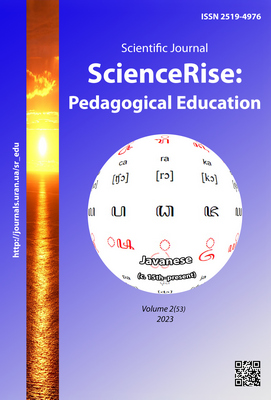The role of the family in the formation of moral qualities of teenagers
DOI:
https://doi.org/10.15587/2519-4984.2023.283865Keywords:
socialization, family, adolescent, social education, education, social relations, parent, formation, bring up, childAbstract
The family as an integral unit of society and a unique aspect of social relations is an important means of education and the formation of the moral foundations of the younger generation. It is in it that a complex and important process of the formation of a person’s personality takes place in all directions: physical, labor, spiritual, moral, aesthetic. The family not only lays the foundation, but also surrounds the person, living forever and consistently acquiring strong spiritual values, which expands the possibilities for spiritual upbringing and education, the formation of worldviews and enrichment of the inner world. It is here that the student first enters social life, studies his/her values, norms of behavior, way of thinking and language. In other words, the family is a school of education, the transfer of life experience, worldly wisdom.
The main goal of the study is to determine the role and importance of the family in the formation of students as individuals.
Awareness and realization of the needs and possibilities of forming a person’s moral principles in the family is one of the conditions for the comprehensive development of the individual. Therefore, it is important to determine the choice of “maternal connection” in the spiritual and moral world of a person in each specific historical period, with which you can show the optimal control effect on the nature of his/her spiritual and moral formation.
The family, in turn, is a mechanism that follows from the moral, ethical, and sociocultural norms of society as a whole, laying the foundations for the moral education of the student’s personality and developing a mechanism for controlling his/her behavior. The existence of contradictions between these norms in real life further enhances the role of the family as an intermediary between society and the individual and affects the formation of the values of the young generation
References
- İmamverdiyeva, N., Mirzəliyeva, N. (2022). Yeniyetməlik və yetkinlik yaşına çatmış uşaqların sosiallaşmasına ailədaxili münasibətlərin təsiri. Metodik vəsait. Bakı, 206.
- Hüseynzadə, R. L., Allahverdiyeva, L. Z. (2016). Ailə pedaqogikası. Dərslik. Bakı: ADPU, 340.
- Əlizadə, H. Ə. (2014). Sosial pedaqogika. Bakı: Elm, 487.
- Watson, G. (1933). A critical note on two attitude studies. MentalHygiene, 412.
- Pchelintceva, N. D. (2001). Vospitanie detei i podrostkov v selskoi azerbaidzhanskoi seme (vtoraia polovina KhKh veka). Moscow, 147.
- Mutallimov, T. B. (2007). Osobennosti formirovaniia natcionalnogo dukha azerbaidzhanskogo etnosa. Ufa, 178.
- Faber, A. (2009). Kak govorit, chtoby deti slushali, i kak slushat, chtoby deti govorili. Moscow: Eksmo, 384.
- Volkov, G. N. (2000). Etnopedagogika. Moscow: Izdatelskii tcentr «Akademiia», 176.
- Waters, V. (1988). The rational-emotive point of view of discipline. New York: International Universities Press, Inc., 626.
- Travillion, K., Snyder, J. (1993). The role of maternal discipline and involvement in peer rejection and neglect. Journal of Applied Developmental Psychology, 14 (1), 37–57. doi: https://doi.org/10.1016/0193-3973(93)90022-n
Downloads
Published
How to Cite
Issue
Section
License
Copyright (c) 2023 Narmina Mirzaliyeva Seyfal

This work is licensed under a Creative Commons Attribution 4.0 International License.
Our journal abides by the Creative Commons CC BY copyright rights and permissions for open access journals.
Authors, who are published in this journal, agree to the following conditions:
1. The authors reserve the right to authorship of the work and pass the first publication right of this work to the journal under the terms of a Creative Commons CC BY, which allows others to freely distribute the published research with the obligatory reference to the authors of the original work and the first publication of the work in this journal.
2. The authors have the right to conclude separate supplement agreements that relate to non-exclusive work distribution in the form in which it has been published by the journal (for example, to upload the work to the online storage of the journal or publish it as part of a monograph), provided that the reference to the first publication of the work in this journal is included.








